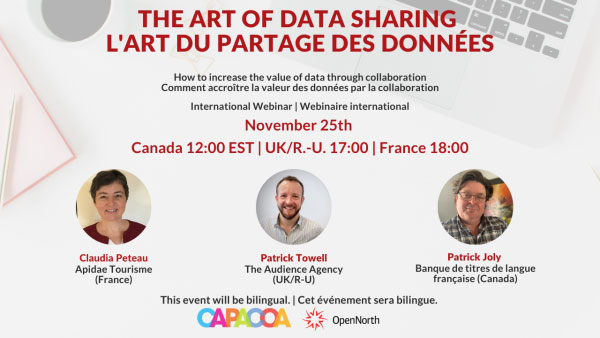Thank you to all of our participants who joined The art of data sharing webinar on Nov. 24th, 2020. We are happy to share the recording of the event with you!

Note: The recording is bilingual and does not include subtitles.
Open North partnered with CAPACOA, a performing arts service organization, to explore the use of a data charter to improve data collaboration in the Canadian performing arts sector. As part of this research, the two organizations held a webinar, The art of data sharing, to learn about how Apidae Tourisme, The Audience Agency, and la BTLF developed successful data collaboration initiatives!
About the Webinar Hosts
Claudia Peteau, Apidae Tourisme
Apidae Tourisme is “the first information network for tourism data” in France and is designed to facilitate information sharing among local French government departments and individual culture and arts organizations. They gather and share data to create a better understanding of tourism offerings in regions, ultimately promoting the discoverability of local events and points of interest. Apidae Tourisme does this by warehousing and sharing data from the network. Because this is a voluntary approach that relies on data contribution from a network of organizations, Apidae Tourisme focuses on connecting different organizations and promoting synergies among its members.
Apidae Tourisme has been incredibly successful. They work with over 25 departments and hold information on over 370,000 points of interest. The organizations in their network come together to solve issues related to their data, resulting in over 2,000 digital projects that use the data to the benefit of members of the community. The value comes from having a multitude of local and national actors wanting to collaborate, create better profiles of tourism offerings for regions, and keep tourists informed of local product and service offerings.
Patrick Towell, The Audience Agency
The Audience Agency created a national audience data and development tool called Audience Finder to help arts & culture organizations in the United Kingdom understand and compare their audiences. With the goal to better understand audiences across the U.K., The Audience Agency aggregates data from all arts and culture organizations that receive funding from The Arts Council of England. This allows organizations to have a better understanding of their own audience, national audience trends, as well as access to tools to help them report to their funders and adapt their services.
The Audience Agency has a robust and established governance program. One tool that has proven useful is its community charter. The community charter is a governance tool to align and share their values with partners and it helps to instill trust in data sharing. It has become an excellent tool for the Audience Agency as they moved beyond working with just English organizations to expand their services into Wales, Scotland, as well as internationally. Their charter concretizes their organizational culture of trust and listening to the needs of organizations in their network.
Patrick Joly, La BTLF
La BTLF is the digital partner of the French language book industry in Canada. Working in the middle of the “book chain”, la BTLF focuses on standardizing metadata to improve sales, marketing, and promotion of French language books in Quebec. A big part of their work is ensuring high-quality data flows between writers and publishing houses to book sellers and libraries. Part of how they ensure high-quality data is by specifying what that means to each actor in the “book chain”, through their “politique de referencement”. This allows La BTLF to publish metadata quickly to their two main databases: Memento, which houses information on over 2.5 million french language books, and Gaspard, a real-time book sales database.
La BTFL’s focus on high-quality metadata for the book industry pays off. In a recent study, they found that books with enriched metadata had higher sales than those without it.
Governing data in the performing arts sector:
So what have we learned about the performing arts sector in Canada? One of the overarching themes is that it takes time to develop governance systems that generate value from sectoral data. Learning from others is an early step on the journey to a collaborative data governance system.
There are also various models of data collaboration that exist and they all have their own benefits. We heard about a decentralized approach based on a network of individual organizations as well as centralized databases built for trusted data-sharing among competing organizations. What the models had in common were clear goals that were agreed on by all partners.
Our project with CAPACOA will continue in 2021 in order to explore the use of a data charter for data collaboration. Stay tuned for opportunities to provide further input, such as through our upcoming survey and workshop. Please join our mailing list at the bottom of this page if you’d like to be notified of these upcoming opportunities.
Finally, we would like to thank our speakers as well as CAPACOA for collaborating with us on this important work!
Contact Open North today to learn more about our Smart City & Open Data Solutions.